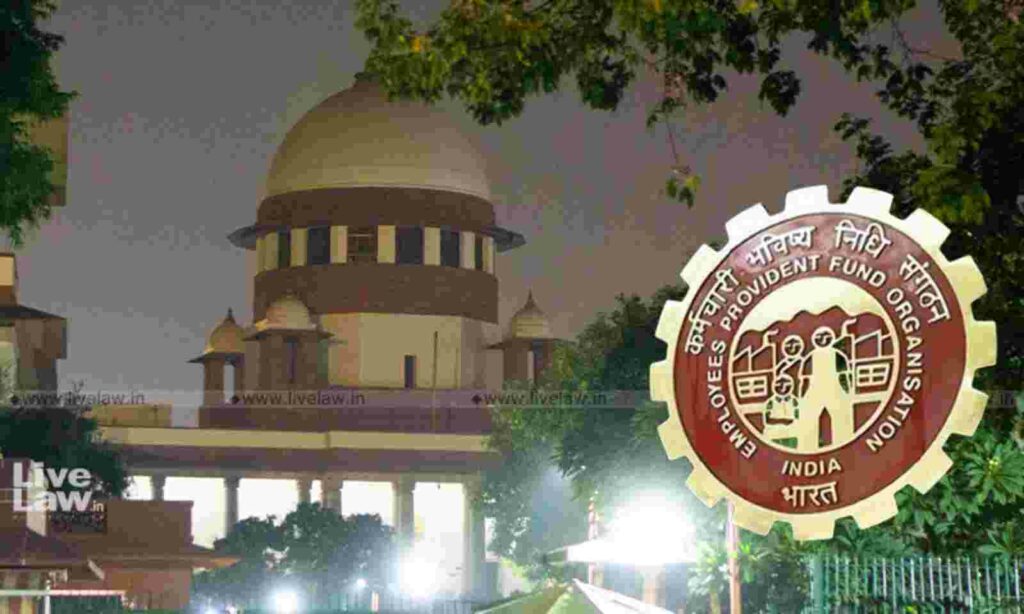![]()
The Supreme Court on Tuesday heard the arguments of the Employees Provident Fund Organization in the appeal filed by it challenging the judgments of various High Courts which quashed the Employee’s Pension (Amendment) Scheme, 2014.
A bench comprising Justices UU Lalit and Ajay Rastogi heard the arguments made by Senior Advocate C Aryama Sundaram on behalf of the EPFO.Sundaram argued that the High Courts lost sight of the fact that the employees who drew salary in excess of the stipulated limit had to exercise the option of making the joint contribution along with the employer in order to become eligible to Employees Pension. The Employees Pension Scheme, when introduced in 1995, had set an upper limit of pensionable salary as Rs.5,000 per monthh, which was later increased as Rs 6,500 per month. Subsequently, a proviso was added to paragraph 11(3) of the Pension Scheme with effect from 16.03.1996 granting an option to the employer and the employee to contribute amounts towards the pension fund at the rate of 8.33% of the actual salary drawn by the employee, where the salary exceeded Rs.6,500 per month.
Later in 2014, the upper limit was hiked as Rs 15,000 per month, and the proviso to paragraph 11(3), which gave the option of joint contribution for salary exceeding the upper-limit, was deleted. The amendments made by 2014 were invalidated by the High Courts
Sundaram argued that the High Courts assumed that employees would be automatically covered by the EPS scheme, even without making the option for joint contribution.
“Let us assume the High Court is right in saying 11(3) & (4) is arbitrary and are thus struck down. What’s the consequence? Consequence is… it reverts proviso of 11(3)”, Sundaram submitted.
“It reverts to ceiling limit of 6500. But again, point remains, regular contributions have to be made”, Justice Lalit observed.
“That’s what High Court has lost sight of. High Court assumes that contribution at time of opting was not required”, Sundaram replied.
“The challenge is against 2014 amendment. There is no challenge to 1995 scheme. So where in para 11 or any where else is there any entitlement to pension if you haven’t contributed to the fund? If there is no such entitlement, how can it be retrospectively permitted?! I can understand if there was an entitlement under unamemded scheme. Right was not to get a pension, right was to exercise an option. Exercise option at day 1 when salary exceeded ceiling and actually remit the money. Now, if you don’t do any of those 3, where does the right arise under the 1995 scheme? High Court went wrong in asking itself the wrong questions”, Sundaram argued.
The Kerala High Court, while setting aside the 2014 amendments by its 2018 judgment, had declared that all the employees shall be entitled to exercise the option stipulated by paragraph 26 of the EPF Scheme without being restricted in doing so by the insistence on a date. Further, the High Court had also set aside the orders issued by the EPFO declining to grant opportunities to the employees to exercise a joint option to remit contributions to the Employees Pension Scheme on the basis of the actual salaries drawn by them.
Explaining the 2014 scheme to the bench, Sundaram said that it omitted the proviso to 11(3), and added 11(4), which applies only to person who exercised that option earlier.
Taking a glance at the provisions, Justice Lalit observed “What it shows is… those who were availing benefit of 11(3) earlier will continue to avail that benefit provided this option is exercised. Which means there can never be retrospectivity”.
Sundaram then took the bench through the judgment in R.C Gupta and others v. Regional Provident Fund Commissioner, Employees Provident delivered by the Supreme Court on October 4, 2016. The arguments will continue tomorrow.
In April 2019, the Supreme Court had dismissed the special leave petition filed by the EPFO against the Kerala High Court’s judgment, through a summary order. Later, in January 2021, a three judge bench recalled the dismissal order in the review petitions filed by the EPFO, and posted the matters for hearing in open court.On February 25, 2021, the division bench of Justice UU Lalit and Justice KM Joseph restrained the High Court of Kerala, Delhi and Rajasthan from initiating contempt proceedings against the Central Government and the EPFO over non-implentation of the HC verdicts. The bench also posted the matters for final hearing.
How useful was this post?
- Share review with rating here: Google Review
We are providing practical training (Labor Laws, Payroll, Salary Structure, PF-ESI Challan) and Labor Codes, Payroll Consultant Service & more:
- HR Generalist Practical Training: https://oneclik.in/hr-generalist-practical-training/
- Labor Law + Payroll-Practical-Training: https://oneclik.in/labor-law-payroll-practical-training-certificate/ (PF, ESI, Bonus, Payroll & more)
- Labor Code, 2020 (Crash Course): https://oneclik.in/labor-code2020-rules-practical-training-certificate-crash-course/
- Labour Code | Labour Bill (Labour-Law-Practical-Training): https://oneclik.in/labour-law-practical-training/ (Factory, Contact Labor, Maternity Act & more)
- PF – ESI Consultant Service: https://oneclik.in/pf-esi-consultant-service/
- Labor Law, Compliance & HR – Payroll Management
- Advance Excel Practical Training: https://oneclik.in/advanced-excel-practical-training-certificate/
Get Latest HR, IR, Labor Law Updates, Case Studies & Regular Updates: (Join us on Social Media)
- Telegram Channel: “One Clik”
- Whatsapp Group: https://wa.me/919033016939
- Facebook: One Clik
- Linkedin: One Clik
- Instagram: oneclik_hr_management
- YouTube: One Clik

